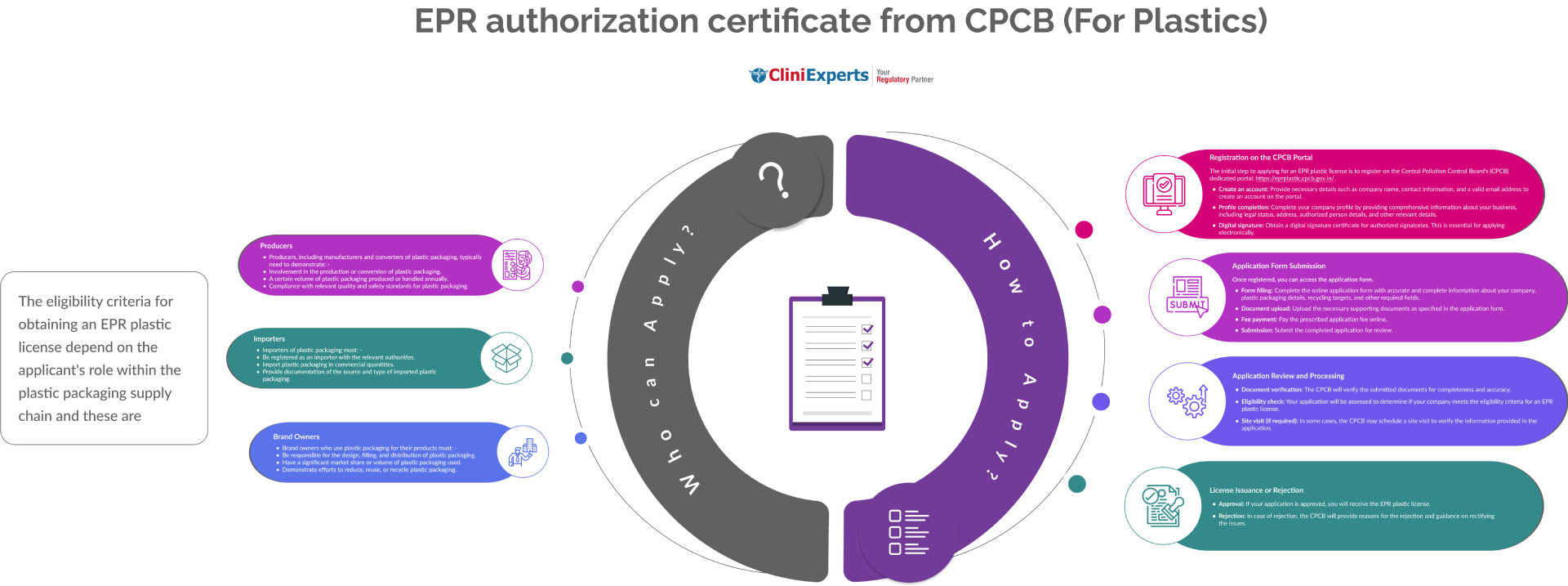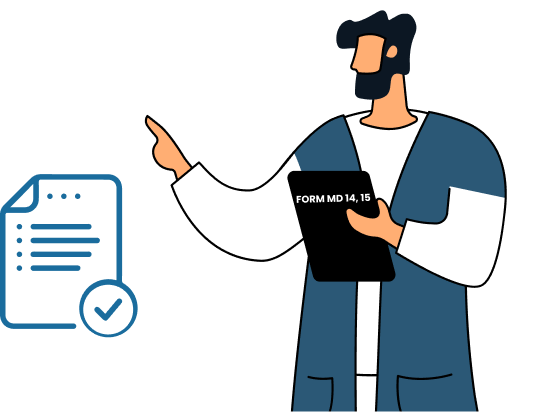EPR authorization certificate from CPCB in India

Navigating the complex EPR plastic regulations can be overwhelming. Let Cliniexperts be your guide. From completing Form 1 and other essential documents to ensuring seamless approval, we handle the entire process. Our expertise in document preparation, return filing, and deep understanding of mandates guarantee smooth sailing. As your compliance partner, we'll help you avoid penalties and focus on your core business.
EPR authorization certificate from CPCB – Overview
Who Can Apply?
The eligibility criteria for obtaining an EPR plastic license depend on the applicant's role within the plastic packaging supply chain and these are:
- Producers: Producers, including manufacturers and converters of plastic packaging, typically need to demonstrate:
- Involvement in the production or conversion of plastic packaging.
- A certain volume of plastic packaging produced or handled annually.
- Compliance with relevant quality and safety standards for plastic packaging.
- Importers: Importers of plastic packaging must:
- Be registered as an importer with the relevant authorities.
- Import plastic packaging in commercial quantities.
- Provide documentation of the source and type of imported plastic packaging.
- Brand Owners: Brand owners who use plastic packaging for their products must:
- Be responsible for the design, filling, and distribution of plastic packaging.
- Have a significant market share or volume of plastic packaging used.
- Demonstrate efforts to reduce, reuse, or recycle plastic packaging.

How To Apply?
The Applicant must follow the following process:
-

1. Registration on the CPCB Portal: The initial step to applying for an EPR plastic license is to register on the Central Pollution Control Board's (CPCB) dedicated portal: https://eprplastic.cpcb.gov.in/.
-

Create an account: Provide necessary details such as company name, contact information, and a valid email address to create an account on the portal.
-

Profile completion: Complete your company profile by providing comprehensive information about your business, including legal status, address, authorized person details, and other relevant details.
-

2. Application Form Submission: Once registered, you can access the application form.
-

Digital signature: Obtain a digital signature certificate for authorized signatories. This is essential for applying electronically.
-

Form filling: Complete the online application form with accurate and complete information about your company, plastic packaging details, recycling targets, and other required fields.
-

Document upload: Upload the necessary supporting documents as specified in the application form.
-

Fee payment: Pay the prescribed application fee online.
-

Submission: Submit the completed application for review.
-

3. Application Review and Processing
-

Document verification: The CPCB will verify the submitted documents for completeness and accuracy.
-

Eligibility check: Your application will be assessed to determine if your company meets the eligibility criteria for an EPR plastic license.
-

Site visit (if required): In some cases, the CPCB may schedule a site visit to verify the information provided in the application.
-

4. License Issuance or Rejection
-

Approval: If your application is approved, you will receive the EPR plastic license.
-

Rejection: In case of rejection, the CPCB will provide reasons for the rejection and guidance on rectifying the issues.

Validity
Unlike most environmental licenses, Extended Producer Responsibility (EPR) registration for plastic packaging has a lifetime validity. This eliminates the need for periodic renewals, saving you time and administrative hassle. However, it's crucial to remember that ongoing compliance is still essential. You'll need to file annual returns and fulfill your plastic waste collection and recycling targets as mandated by the Government of India. By remaining compliant, you contribute to a more sustainable future for plastic waste management.
Fee Involved
The government has outlined a fee structure for obtaining an EPR license, categorized based on the annual plastic waste generated. Businesses generating.- less than 1000 tonnes of plastic waste per year will be charged Rs. 10,000, those generating between 1000 and 10,000 tonnes will pay Rs. 20,000, and
- those exceeding 10,000 tonnes face a fee of Rs. 50,000.
Important Documents

- Business Establishment: DIC Certificate (if applicable).
- EPR Action Plan: Documents related to the Action Plan for fulfilling EPR liability (State/UT wise).
- Company Documents: PDF copy of the Company's PAN, CIN & GST (combined copies of GST invoices in all the States/UTs where the PIBO is operating).
- Business Registration: Proof of Selling in more than two states (GST/tax invoice etc.)
- Environmental Compliance: Valid Consents under the Air & Water Act (if applicable).
- Agreements: Agreement of PIBO/WMA with PWPF for PW processing (as applicable), Agreement of PIBO with WMA (as applicable).
- Engagement with Waste Management: Document issued by ULB / designated state authority related to engagement of PIBO/WMA (as applicable).
- Processor Registration: Registration issued by SPCBs/PCCs to PWPF to be engaged with for PW processing
Timeline to get from Central Drugs Standard Control Organisation
45
DaysEssential Tips
- Focus on Plastic Packaging Weight: Accurately determine and report the weight of plastic packaging for precise application data.
- Partner with a Recycler: Collaborate with a certified recycler or environmental experts to ensure compliance with recycling regulations and facilitate annual reporting.
- Timely Submission: Adhere to deadlines for submitting required documents and forms to avoid delays in the application process.
- Potential challenges during a licensing process are:
- Technical Issues: System glitches or slow performance due to the new government portal may hinder the application process.
Expert Advise
Our expert team offers comprehensive guidance to streamline your EPR Plastic License journey. These include:
- Form completion: Ensure the application forms are filled and necessary fees paid.
- Regulatory compliance: Ensure adherence to all EPR regulations and guidelines.
- Portal navigation: Expert assistance in using the CPCB portal for a seamless application process.
Related Services
Endorsement Of Predicate In-vitro Diagnostics In Import License in India - MD-14 & MD-15
Importer | Regulatory Body: CDSCO
Fast track your medical device imports with our MD-15 endorsed Predicate In Vitro Diagnostic service. Simplify compliance and expedite approval processes effortlessly.
Test License to Import In-vitro Diagnostics in India in India - MD 16 & MD 17
Importer | Regulatory Body: CDSCO
Do you need permission to import in-vitro diagnostic kits to India to demonstrate its performance? CliniExperts’ professionals have the expertise and assist you in securing in-vitro diagnostic kits test license for importer.
Frequently Asked Questions
What is the EPR Plastic License and why is it required?
The EPR Plastic License is a government-mandated permit for businesses introducing plastic packaging into India. It ensures producers, importers, and brand owners take responsibility for managing the plastic waste generated from their products.

What documents are needed to apply for an EPR Plastic License?

How do I obtain an EPR Plastic License?
The application process involves registering on the CPCB portal, submitting the necessary documents, and awaiting approval. Once granted, you must comply with annual reporting and recycling targets.

What is the processing time for an EPR Plastic License application?
The usual processing time for an EPR Plastic License is approximately 45 working days. However, this timeframe may vary based on application completeness and other factors.

What are the consequences of not complying with EPR regulations?
Failure to comply with EPR regulations can lead to penalties, including fines and legal action. Maintaining compliance is essential for avoiding legal issues and upholding environmental responsibility.

What Types of Plastic Packaging are Covered by EPR?
The Extended Producer Responsibility (EPR) regulations for plastic packaging categorize waste into four primary types:
a) Compostable Plastic Sheets and Carry Bags: Made from compostable materials designed to break down naturally.
b) Flexible Plastic Packaging: Includes single or multi-layer plastic films, sheets, bags, sachets, and pouches.
c) Rigid Plastic Packaging.
d) Multilayer Plastic Packaging: Combines at least one layer of plastic with at least one layer of a different material.

